Why there is no dedicated wiki for Molecular Biology and Microbiology
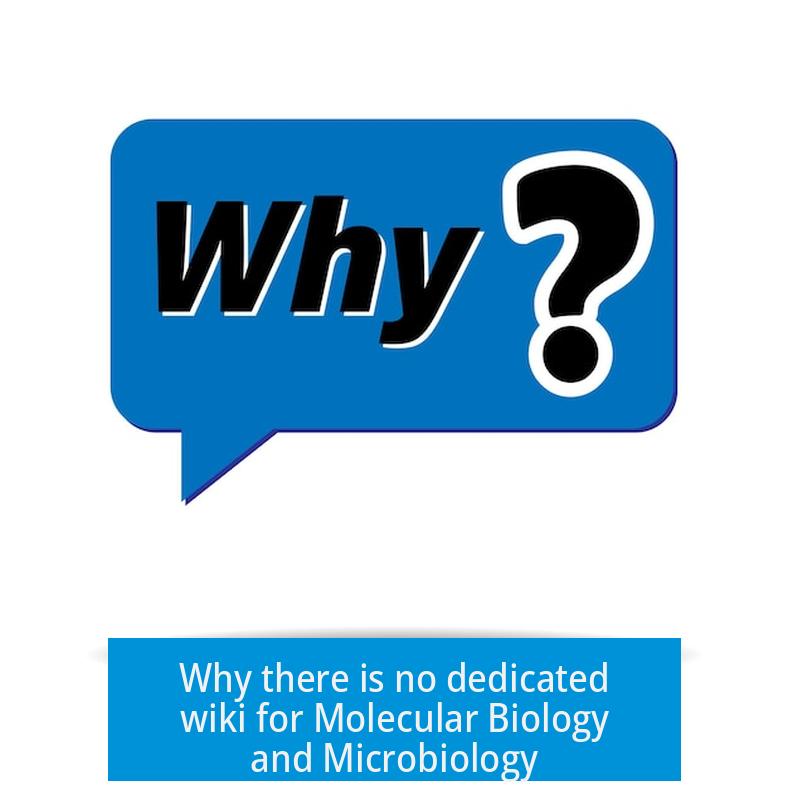
There is no widely used, centralized wiki for molecular biology and microbiology because existing resources favor traditional authoritative materials, the nature of scientific protocols resists open wiki editing, and collaborative platforms with controlled authorship better serve the field’s needs.
Established Resources Are Primarily Books and Paid Content
The molecular and microbiology fields rely heavily on comprehensive books and journals for reference. Institutions like Cold Spring Harbor Laboratory Press publish detailed, peer-reviewed materials that encompass most topics of interest. These resources cost money but provide reliable, curated content trusted by researchers and educators.
Challenges of Wiki Platforms in Science
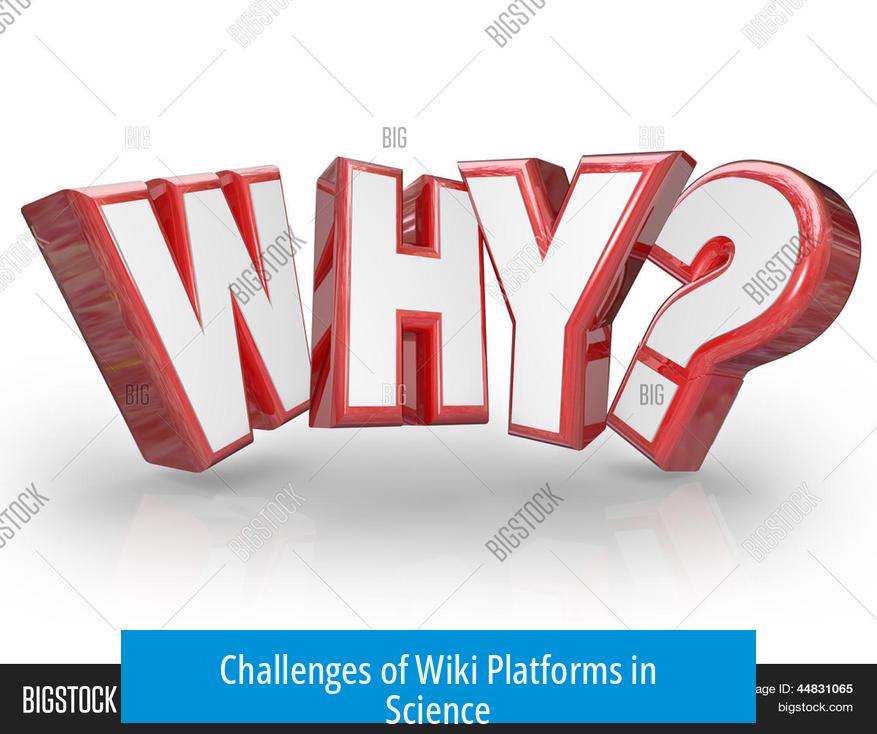
- Underused Platforms: OpenWetWare is an existing wiki dedicated to biology protocols. However, it shows limited active participation, reducing its usefulness.
- Scientific Culture Limits Wiki Editing: Lab protocols are sensitive to small changes. Scientists often prefer keeping personal edited versions rather than collaboratively updating a shared document. This practice prevents convergence to a single standard.
- Preference for Controlled Content Maintenance: Platforms such as protocols.io assign clear authorship and allow forking. This setup maintains quality and accountability better than anonymous wiki editing.
Authoritative Protocols via Traditional Channels
Protocols such as those by Sambrook and Cold Spring Harbor continue to be published through formal channels, including journals and books. This method ensures rigor and validation, important for reproducibility in research.
Risks of Wikipedia-style Editing for Scientific Protocols
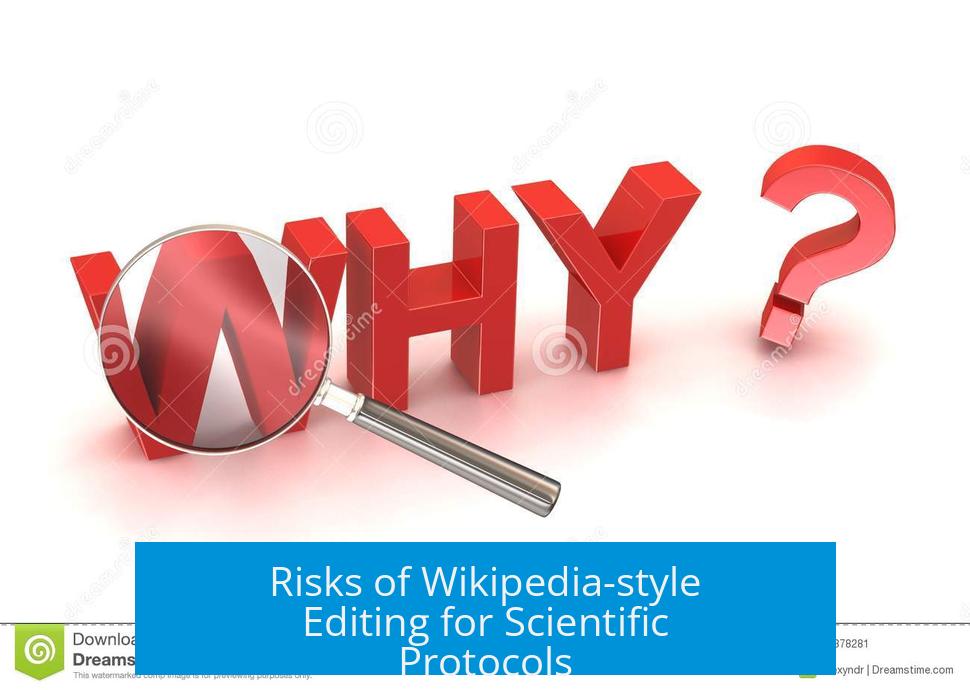
Open editing poses risks. Anyone can modify protocols, potentially introducing errors or unsafe procedures. Trusted protocols require peer review to ensure accuracy and reproducibility—something open wikis find difficult to guarantee.
Difficulty in Accommodating Protocol Variations
Many molecular biology techniques have numerous valid variations depending on experimental goals and conditions. Capturing all these in a single wiki, while preserving clarity, presents a substantial challenge. Scientists often rely on specific published papers or personal communication for these nuanced details.
Alternative Resources for Protocols and Troubleshooting

- Older sites like Protocol-Online and IHCworld offer protocol collections but may lack regular updates.
- SciFind provides a platform for sharing tacit knowledge such as troubleshooting tips and optimization tricks, facilitating informal scientific exchange.
Key Takeaways
- Reliable, peer-reviewed books and journals dominate molecular and microbiology knowledge sharing.
- Scientific culture and the complexity of protocols inhibit collaborative wiki-style editing.
- Platforms with controlled authorship like protocols.io effectively balance openness and quality control.
- Maintaining accuracy and accommodating variations are major challenges in creating a universal wiki.
Why is there no wiki for molecular biology and microbiology?

The straightforward answer is this: There isn’t a single, comprehensive wiki for molecular biology and microbiology because the field’s culture, complexity, and existing resources make such a platform difficult to sustain and adopt widely. Let’s dig into why this is the case, taking a closer look at the unique challenges that molecular biology and microbiology face when it comes to wiki-style content creation and sharing.
At first, you might think, “Why not crowdsource knowledge for these fields like Wikipedia does for everything else?” Unfortunately, it’s not that simple. The current landscape is shaped by traditions, precision requirements, and the varied nature of protocols underlying these sciences.
The Landscape of Molecular Biology and Microbiology Knowledge
First off, molecular biology and microbiology aren’t unknown territories. They’re well-covered by books and paid materials. Cold Spring Harbor Laboratory Press, one of the giants in scientific publishing, offers books packed with trustworthy, well-vetted content on virtually every topic in these fields. But here’s the catch: you have to buy them. They’re affordable and valuable, but not free.
That’s a crucial reason why there isn’t a free wiki that’s widely accepted—it’s not just about knowledge being out there, it’s about the format and access. The book publishers have optimized for authoritative, stable knowledge rather than community-editable resources.
Wiki Attempts: OpenWetWare and the Real Challenges

If you’re thinking, “Wait, isn’t there OpenWetWare?”—yes, it exists but it’s underused and struggles to be the go-to place for scientists.
Here’s why: Protocols—the bread and butter of molecular biology labs—are hard to crowdsource. Unlike Wikipedia articles, protocols need precise execution. If someone changes a step, the last thing a meticulous scientist wants to hear is, “Thanks for improving it.” Instead, they might push back, saying, “No, that’s wrong, don’t do it like that.” This culture discourages collaborative editing since it’s easier to just copy and tweak privately than to debate protocol edits publicly. Protocols don’t organically “converge” into one perfect version on a wiki—they fragment into many “house rules” versions. The result? No single living protocol emerges, which undermines the core appeal of the wiki format.
Author-Maintained Content Triumphs Over Open Editing
Platforms like protocols.io offer a glimpse of how content might be shared better: each protocol has specific authors who maintain it. Other users can comment or fork it, but can’t directly overwrite someone else’s work. This approach balances control and collaboration and suits scientific work much better than open wikis do.
Besides that, authoritative protocols continue to be published via traditional journals. For example, Cold Spring Harbor publishes CSH Protocols, a dedicated journal for well-curated, peer-reviewed lab methods. Scientists prefer these stable, trusted sources over the chaos potential of open editing.
Why Wikipedia-Style Editing Poses Risks for Lab Protocols
Wikipedia allows anyone to change information, and that reflects the best and worst of crowdsourcing. In molecular biology, this is risky territory. A small protocol tweak can make or break an experiment. Reliable execution depends on understanding the subtleties behind steps—not just the steps themselves.
Scientists are trained to read original papers and understand variations in context. Blogs and wikis that encourage unvetted edits risk spreading half-baked or harmful instructions. Anyone casually editing lab protocols runs a high chance of introducing errors without explaining why changes matter.
The Complexity of Protocol Variations: Why One Wiki Can’t Cover It All
Think about it: even a “standard” molecular biology protocol doesn’t stay standard for long. Each lab customizes it based on reagents, equipment, and goals. A single wiki page won’t capture all this variability or the reasoning behind it.
Instead, scientists keep their own versions or maintain small group-specific protocols. Trying to merge diverse, sometimes contradictory variations into one wiki page is nearly impossible.
Other Helpful Resources: Where Do Scientists Turn?
- Protocol-Online (protocol-online.org): Useful for students and beginners as a starting point, even if it’s less active these days.
- IHCworld (ihcworld.com): Specializes in histology-related protocols and discussions.
- SciFind (scifind.io): A platform where researchers share tacit knowledge—like troubleshooting tips, negative results, optimizations—that don’t always make it into official publications. It’s like an insider conversation beyond the paper.
What Can Be Learned Here?
Despite the lack of a comprehensive wiki, molecular biology and microbiology knowledge is far from inaccessible. It’s just guarded by a culture that favors authoritative, controlled, and nuanced knowledge-sharing over blanket crowdsourcing. The risks of misinformation, the importance of nuanced variations, and the tradition of trusting peer-reviewed, author-maintained sources create practical and cultural barriers to a free-open wiki.
For learners and professionals alike, this means:
- Seek established books and journals for reliable protocols.
- Use author-maintained platforms like protocols.io for updated methods.
- Engage with targeted communities such as SciFind for real-world troubleshooting.
- Respect the specificity and complexity of procedures instead of treating them as generalized facts.
Could a Wiki Ever Work Here?
Maybe someday if the platform balances control with collaborative input, supported by community leaders and rigorous peer contributions. Or if AI-driven curation helps merge variations smartly. Meanwhile, the lesson is clear: not all knowledge is suited for the wiki model, especially when precision science and experimentation depend on subtle, context-rich details.
So, next time you’re frustrated by the absence of a molecular biology or microbiology wiki, remember: science likes rules, control, and trusted authority, and that’s why the wiki format hasn’t yet become the standard—despite the tempting appeal of democratized knowledge.
Why hasn’t OpenWetWare become a popular wiki for molecular biology and microbiology?
OpenWetWare exists but is underused. Scientists often prefer to keep their own versions of protocols instead of collaboratively editing one. This limits its growth as a community resource.
Why don’t lab protocols fit well with wiki-style editing?
Protocols face resistance to changes from others. If someone alters steps, original authors may reject edits rather than appreciate improvements. This blocks convergence on a single community standard.
Are there better platforms for sharing molecular biology protocols?
Yes. Platforms like protocols.io allow original authors to control content. Others can comment or fork, which helps maintain accuracy and trust, unlike open-editing wikis.
Why isn’t Wikipedia ideal for molecular biology protocols?
Anyone can edit Wikipedia, which risks inaccurate protocol information. Reliable protocols come from peer-reviewed papers, not open-editable platforms, ensuring methods are validated.
Can a single wiki cover all molecular biology protocol variations?
It is difficult to consolidate all variations in one place. Protocols vary based on experiment needs, making a single resource impractical to cover every method.


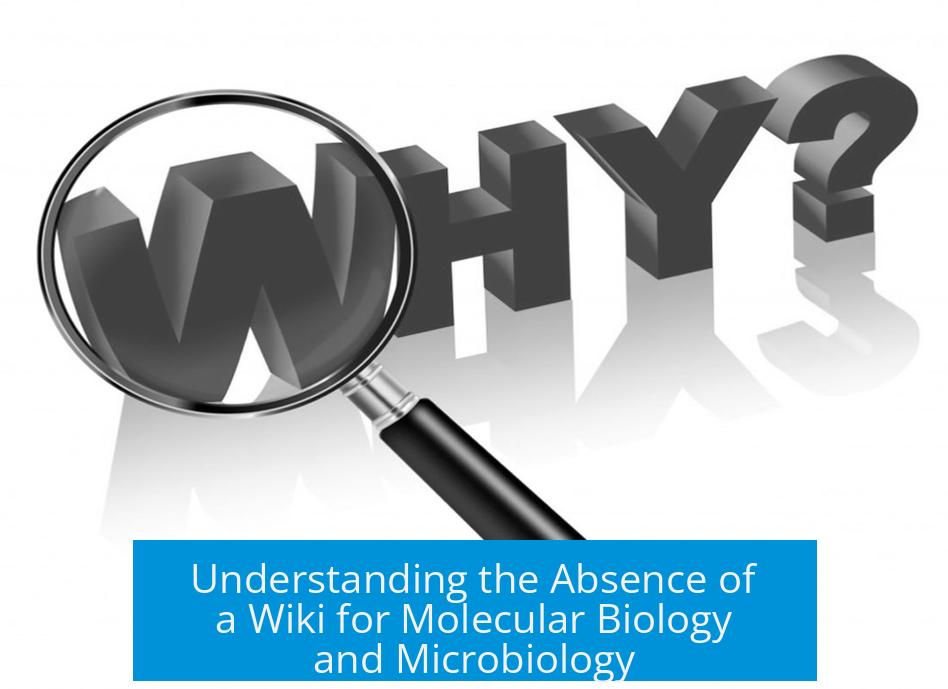
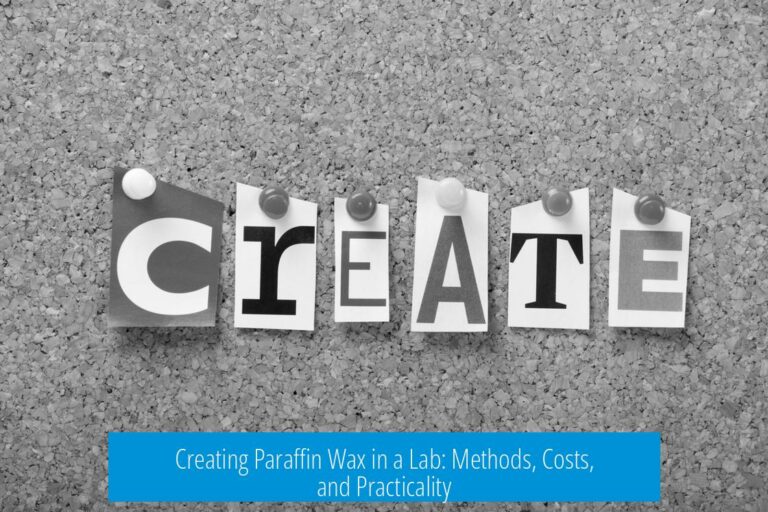

Leave a Comment